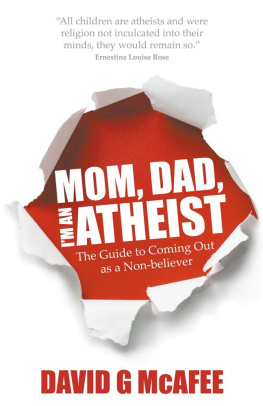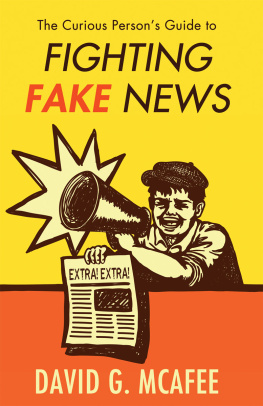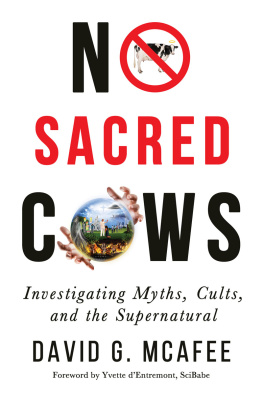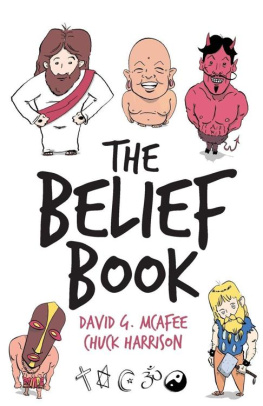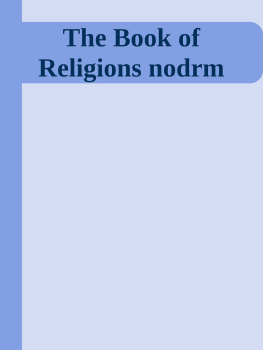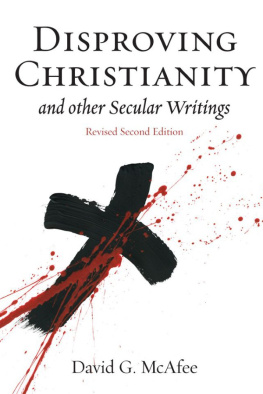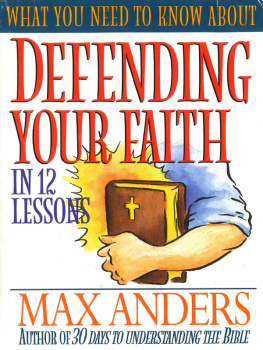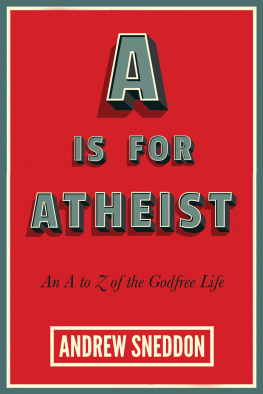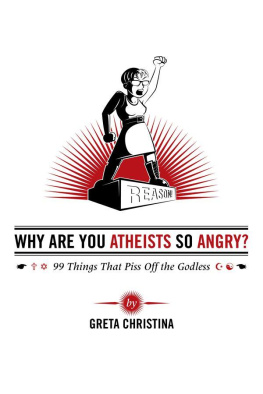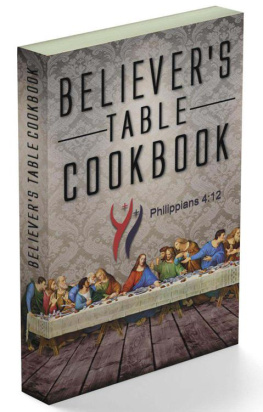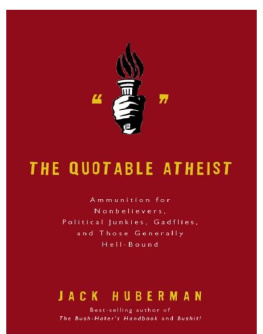MOM, DAD, IM AN ATHEIST
The Guide to Coming Out as a Non-believer
DAVID G McAFEE
First Published in Great Britain 2012
by Dangerous Little Books
Copyright David G McAfee
All rights reserved. No part of this publication may be reproduced, stored in or introduced into a retrieval system, or transmitted, in any form, or by any means (electronic, mechanical, photocopying recording or otherwise) without the prior written permission of the publisher.
Author photograph by Sharona Belles
Cartoons by Chuck Harrison
This book is sold subject to the condition that it shall not, by way of trade or otherwise, be lent, resold, hired out, or otherwise circulated without the publishers prior consent in any form of binding or cover other than that in which it is published and without a similar condition including this condition being imposed on the subsequent purchaser.
For many people, figuring out that the supernatural claims of religions dont hold up to honest analysis is relatively easy. Its the next stepsharing this conclusion with mom and dadthat often proves to be the most difficult of all. Fortunately, David G. McAfee has produced an invaluable contribution to all nonbelievers who find they must navigate that most treacherous minefield known as the religious family. With deep wisdom and sincere compassion, McAfee explores the challenges and suggests the best tactics, while also offering much-needed encouragement for those who may find the journey difficult. It is because he understands that the goal is freethought, self-expression, and the preservation of important relationships, that this book is a precious resource.Guy P. Harrison, author of Race and Reality and
50 Simple Questions for Every Christian
Acknowledgements
To my mom and dad, who never let differences of opinion stand in the way of treating me with love and respect.
Thank you to those who contributed to this work their personal narratives, without which this book wouldnt be possible. Special thanks to Holly Samel, Nickolas Johnson, Elizabeth Rouse, Hugh Kramer, Cleta Darnell, Jason Sciple, and Julia Sciple.
Preface
Intolerance is the natural concomitant of strong faith; tolerance grows only when faith loses certainty; certainty is murderous.Will Durant (November 5, 1885 November 7, 1981)
When you hear the term coming out applied to atheism or non-religiosity, you might jump to a few conclusions you might assume that the act only applies to those who are new to non-belief, or that it is a one-off personal event only involving close family, or that it is only an issue for those raised in fundamentally religious homes in each of these cases, there is certainly more than meets the eye.
I am by no means new to atheism or non-religiosity and, in fact, I was never a believer. But even I had to come out as an atheist at one point or another because theism and religiosity are the assumed points of view in many cultures, including mine. That assumption is interesting in itself because religion is a learned behavior, unlike non-belief; all people are born not believing in a god or gods, and only come to believe in such entities once theyve been taught the idea by others so, atheism is the default position. Despite this fact, in many regions of the world, the simple act of being openly atheist is punishable by death. In other countries, like the United States of America, atheism isnt punishable within the legal system, but discrimination comes in other forms. This is why, even if youve been a non-believer for your entire life, being open about it will almost always result in at the very least some awkward discussions and forced explanations between you and the people with whom you interact regularly. It is my hope that this guide will provide tips and resources for even the most seasoned heathens.
Being an out atheist since childhood, Ive experienced my share of disappointed looks and the occasional intellectual misunderstanding with my religious family members. But it wasnt until I was applying to graduate school for the Religious Studies department at University of California, Santa Barbara, that I realized that being a non-believer can have real effects on my professional and educational lives, in addition to those Id already experienced in my personal life. Being open about my non-belief and my secular activism resulted in my being denied entry to the MA/PhD program and the discrimination grievance that followed. I quickly realized that it is not just family that one worries about in these situations. My experience is more thoroughly documented in Chapter Three: Atheist Activist with an Axe to Grind .
Coming out as an atheist means more than simply telling religious family members about a lack of faith or a loss of faith; in many cases, even people who come from non-religious upbringings have to confront the issue with friends, colleagues, acquaintances, and, in my case, all of the above. As such, coming out is not necessarily a one-time matter, but should instead be considered an ongoing process throughout ones lifetime. As is the case with coming out in the LGBT (Lesbian, Gay, Bisexual, Transgender) community, it is never enough to simply come out once to your family. If you truly want to be an out-of-the-closet non-believer and, perhaps, in the process help other closeted atheists who may be afraid to voice their skepticism, it is sometimes necessary to confront those in day-to-day life who may assume your religiosity or project their religious ideologies onto you.
While those coming from fundamentally religious homes or communities may suffer more deeply from religious oppression and therefore be helped tremendously by the resources and advice provided in this guide, a fundamentally religious upbringing is not a prerequisite for coming out, and people from non-religious upbringings still face difficulties with being honest about a lack of belief in a god or gods. Even in relaxed religious homes, the negative stigma associated with the word atheist alone can cause confusion and potential friction between loved ones.
In Chapter Eleven: Testimonials , I have included stories by non-believers from a variety of backgrounds who tell their stories of de-conversion. But, while this guide was written with input from several contributing authors who experienced coming out to less-than-supportive families or friends, it is important to remember that no two situations are identical and what works for one person, does not necessarily work for another. Like many issues that involve familial transparency, being openly non-religious has different consequences for everyone. And, in dangerous scenarios, it is important to seek professional guidance or counseling. Please see Chapter Twelve: Extreme Situations for further information on that front.
This work is intended to give advice to those who have been afraid to talk about their non-belief and encourage familial honesty, but also to help out atheists deal with the daily interactions and frequently asked questions they may experience in day-to-day life. The resources compiled in Chapter Fifteen: Resources & Support are useful for all those who are non-religious and hope to establish a sense of community with freethinkers, raise children in a secular environment, or simply gain more information about secularism and free thought.
Authors Note: Born Atheist
It is an interesting and demonstrable fact, that all children are atheists and were religion not inculcated into their minds, they would remain so.Ernestine Louise Rose (January 13, 1810 August 4, 1892)

To properly understand this guide to coming out as a non-believer, some might wish to learn more about the particular context in which I, as a secular author, am writing. In Chapter Eleven: Testimonials , youll read six stories from atheists who wished to share their de-conversion testimonials for the benefit of those who may be facing difficulties in their own coming out process. Here, I do the same:
Next page
